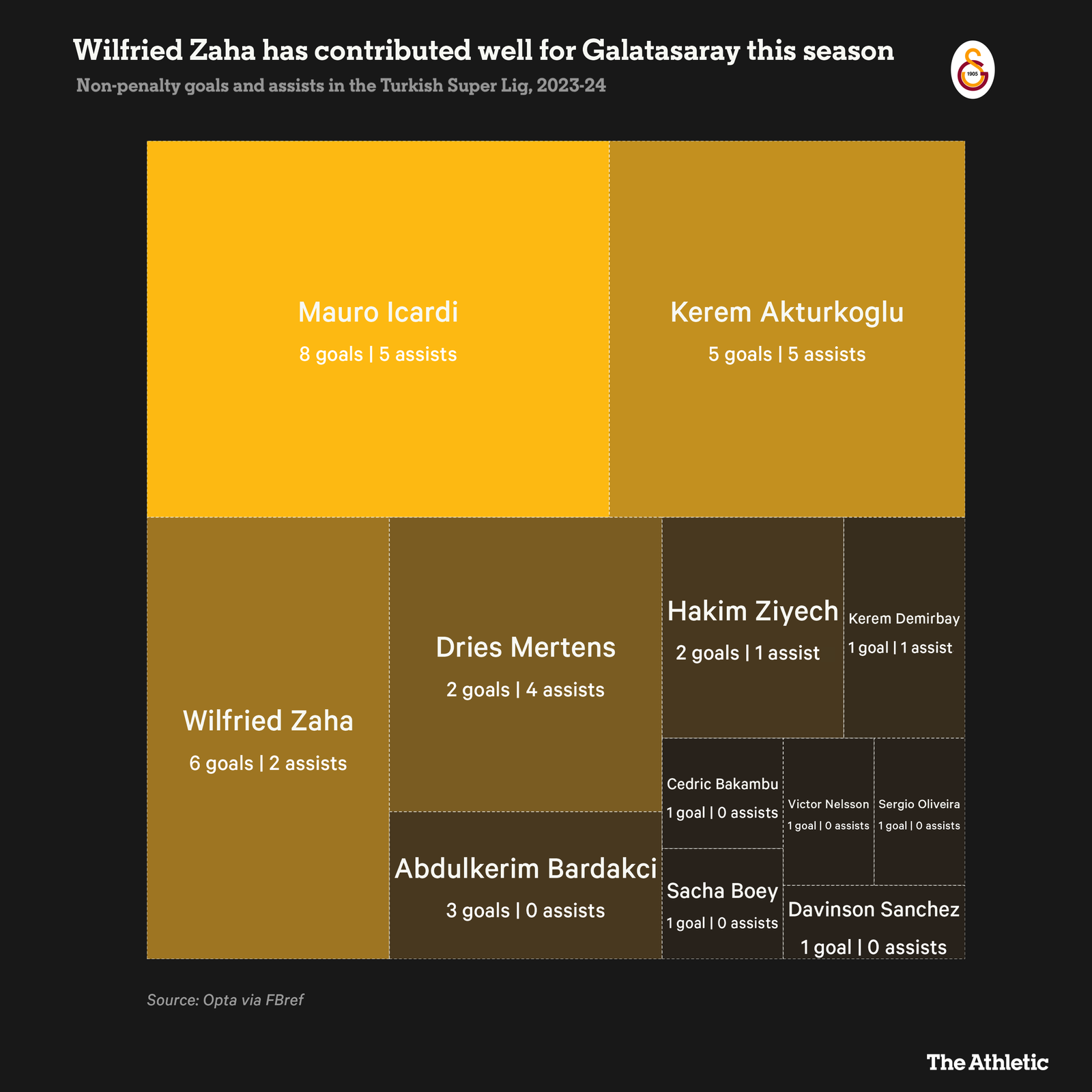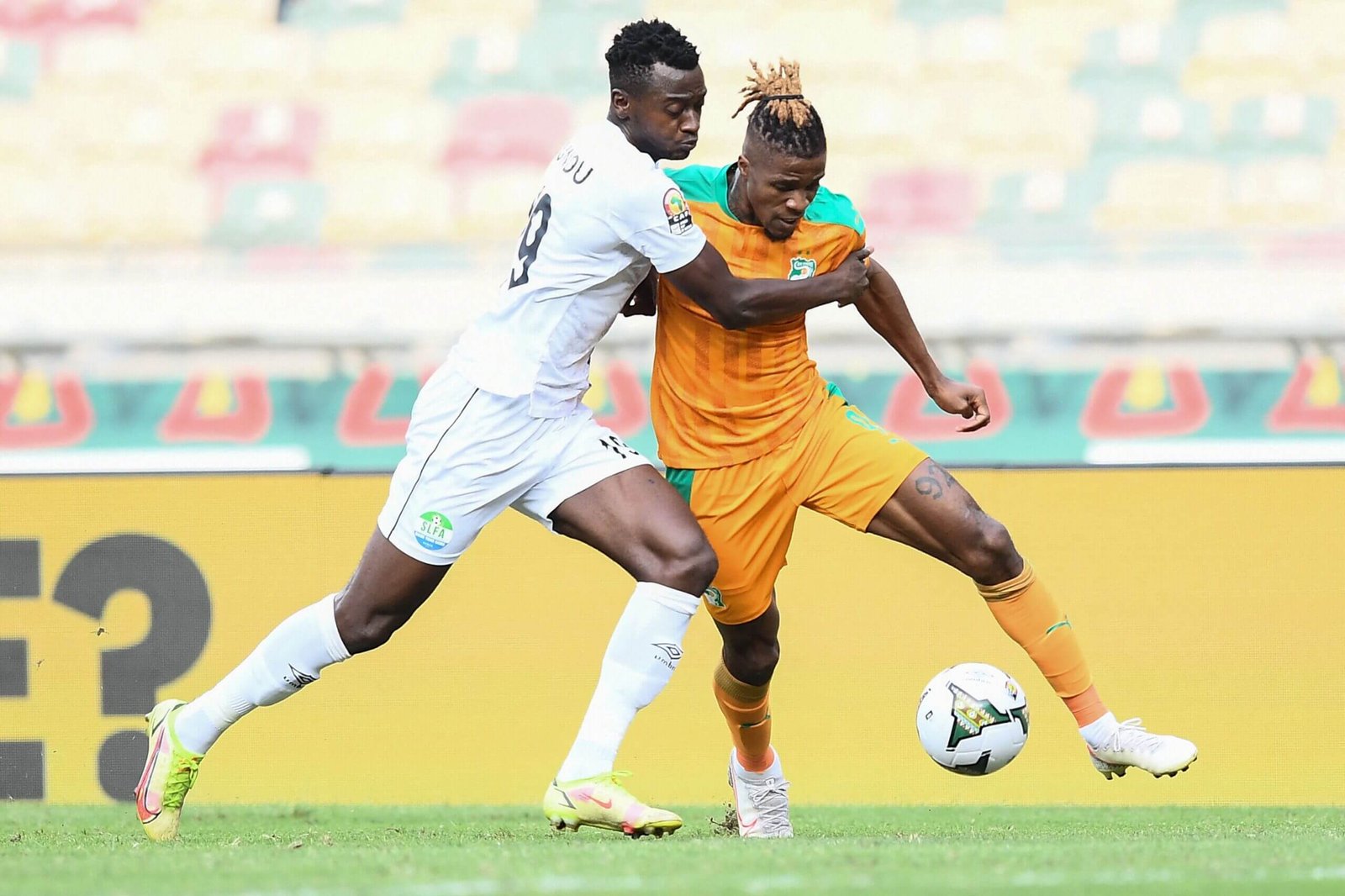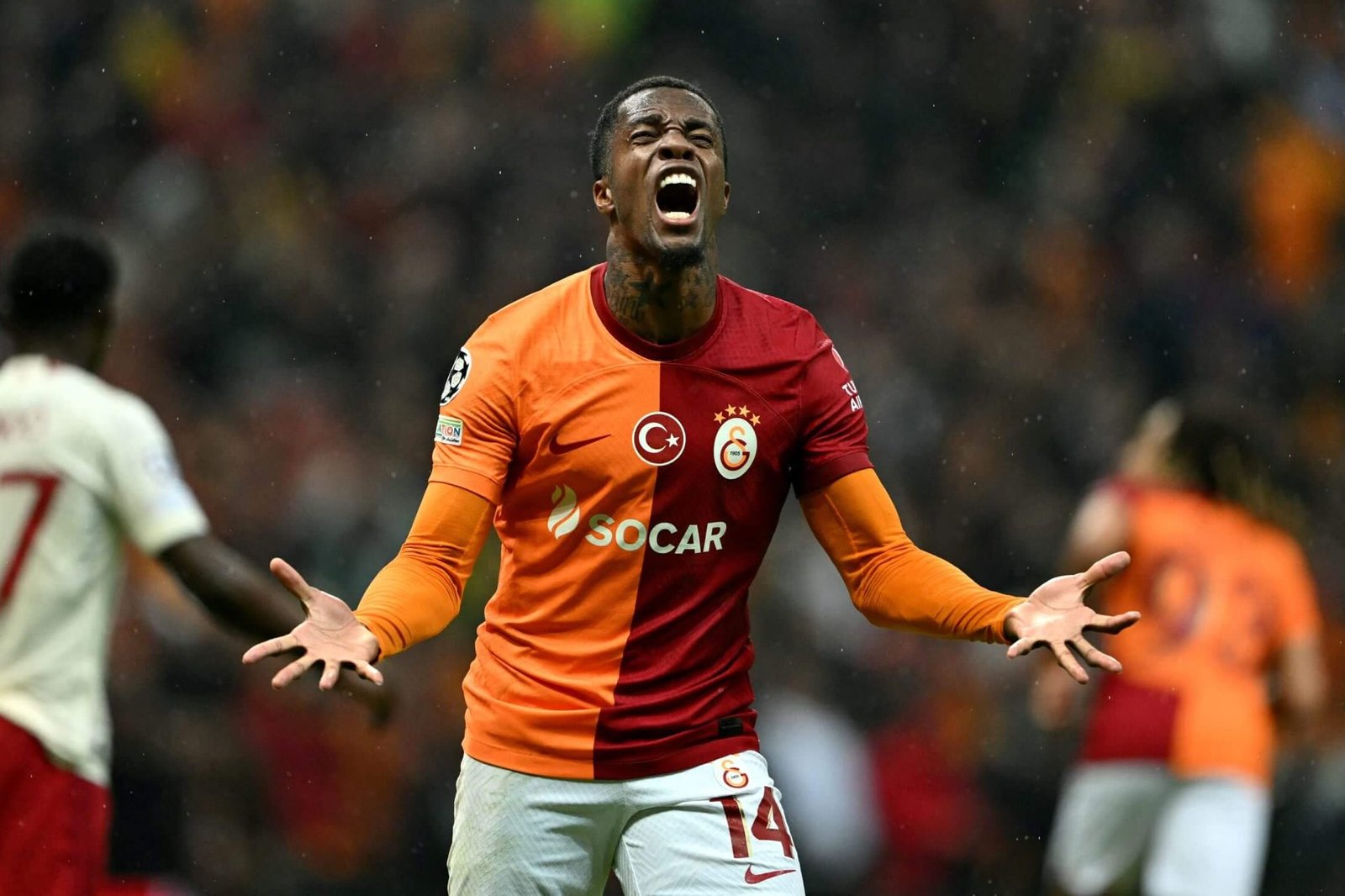When Africa Cup of Nations hosts Ivory Coast line up to play Nigeria this evening (Thursday) in the pick of the tournament’s group games, one of their most recognisable players will be 3,000 miles away.
Wilfried Zaha was omitted from the Ivorian squad for this AFCON by their French manager Jean-Louis Gasset. So instead of lining up against Nigeria in front of a 60,000-strong crowd in Abidjan, the city of his birth, he will be preparing for Galatasaray’s Turkish cup tie against second-tier Umraniyespor.
This was not how it was supposed to be for Zaha, who moved to the Istanbul club last summer from boyhood team Crystal Palace of the Premier League after his contract expired. Gasset claimed he had been left out because his squad is well-stocked in Zaha’s position on the wing, but other factors are at play, too — ones relating to his off-field behaviour rather than what he offers on it.
So how did Zaha and Ivory Coast end up here?
Let’s take it back to the start of the story.
Zaha, who was four years old when his family moved from Ivory Coast to south London, represented England at youth team level. He then played in two friendly matches for the full England team under Roy Hodgson, the last of which was in August 2013.
Having been left out of future squads by Sam Allardyce and Gareth Southgate, Zaha decided to switch allegiance to the country of his birth, thanks, in no small part, to former Chelsea striker and Ivory Coast international Didier Drogba’s powers of persuasion.
“Before, my mindset was playing for England,” Zaha said at the time. “I grew up here. But even through those years, the Ivorian people still supported me through everything. They still showed me love. So when that came about and the space I was in, I just thought, ‘This is the time’.”
Zaha plays for England against Scotland in 2013 (Shaun Botterill/Getty Images)
Southgate, who coached Zaha at England Under-21 level, a spell which included an on-field bust-up with team-mate Ravel Morrison in 2013, was unable to change his mind. He later said he wanted players who “are 100 per cent passionate for playing for England” which upset Zaha, although Southgate claimed those comments had been taken out of context.
He made his second international debut against Sweden, one of the nations he’d faced in his two England games, in January 2017. Since then, he has played another 28 times for Ivory Coast and scored four goals in an international career that has flickered but never fizzed into life in the same way as his club one. His international high point came when he scored two goals at AFCON 2019, when Ivory Coast reached the quarter-finals.
On the face of it, his international record would not suggest he was a guarantee to make Gasset’s squad for this year’s AFCON. He played just twice for his country in 2023, for 24 and 58 minutes in two October friendlies against Morocco and South Africa, albeit the second half of his year was disrupted by injuries. In total, he hasn’t scored in his last 16 games for Ivory Coast.
The flip side is that his form in a counter-attacking Galatasaray side is respectable. He has seven goals and three assists in his 23 matches for them, most memorably the equaliser away against another of his former clubs, Manchester United, in the Champions League group stage.

Galatasaray are second in the Turkish Super Lig, two points behind their arch-rivals Fenerbahce and, while expectations are notoriously demanding, his time in Istanbul could hardly be said to have failed so far.
Even so, Gasset decided to leave him out. It was a punchy call and one he will be judged on. He said: “It was a very difficult decision to take but we already have an exciting squad that boasts of many right-footed wingers. It’s a pure coach’s decision.”
A fair explanation, perhaps. Yet Sol Bamba, a former Ivory Coast international defender, wasn’t convinced. He believed there was more to Gasset’s decision.
“I read the comments from the coach and straight away my first thought was, ‘That’s an excuse, it’s not the real reason’,” Bamba told The Athletic. “I’m not saying we don’t have good players, we do have really good players, but, as a coach, you pick the best and Zaha is one of the best.
“If we’re talking about (whether Zaha should be in) the starting XI then OK, that’s a separate discussion. But to leave him out of the squad and say it’s because there are enough wingers, it’s an excuse.
“I know him personally. He’s a good lad and we got on fine, but as a character he keeps himself to himself. He’s very private and he never got involved with the group in the way that most of the players did. It was a discipline thing — he wanted the leeway sometimes to come to camps two or three days later than everyone else. He’d come to the hotel with his family or his wife, which none of the other players would.

Zaha has struggled to recreate his club form for Ivory Coast (Charly Triballeau/AFP via Getty Images)
“He’d been raised in England, so his French wasn’t great to start with, although it definitely improved. But camaraderie was a massive thing, the laughing, the dancing, the feeling that you’re in it together. That’s the cohesion you need, especially at a big tournament, and to be fair to the coach, if he doesn’t think that Zaha is good for the cohesion, it’s the right decision not to take him.
“He needed to gel more than he did, I think. Some of the other lads, they weren’t having it. They weren’t happy about it. It’s a shame he’s not there, especially with the tournament being in the Ivory Coast.”
Bamba said there had been a similar situation with another player, Christian Manfredini, who also struggled to gel with the group because of the language barrier when he played in an away game against Israel in Tel Aviv in 2008. Manfredini was born in the Ivory Coast but moved to Italy when he was four. He didn’t speak French or English.
Another former Ivory Coast defender, Guy Demel, echoed Bamba’s comments and backed the manager’s choice. He said of Zaha: “He hasn’t been a regular with the national team. When it comes to extra-sporting matters, things happen. If I were Gasset, I wouldn’t take him (either).”
Zaha himself has said nothing about his omission, although his public commentary tends to be limited to cryptic posts on his social media feeds. The most expansive recently was on December 26, when Zaha reflected on “a crazy year with a lot of ups and downs for me personally”.
It is true that, in November 2021, Zaha ruffled feathers when he asked not to be included in the squad for their World Cup qualifiers against Mozambique and Cameroon under previous manager Patrice Beaumelle.
“He asked not to come, because he comes home sick after each meeting,” said Beaumelle at the time. “He wants to reflect on the rest of his international career. I want soldiers; warriors who, even with one knee on the ground, will come to the selection. It is a message that I send loud and clear to each player.”
In response, Zaha strongly refuted the suggestion he was reconsidering his international playing career.
He said, “To pull on the Ivory Coast shirt and represent my country is an honour that I never, ever take for granted. During the last international fixtures, I picked up a viral infection while travelling and was ill when I returned, unable to train, and was forced to miss Crystal Palace’s game against Arsenal. As I don’t feel fully recovered, I spoke to the manager, and asked his permission to miss the next two games.
“I will of course be available and present if I am selected for future games.”
Fast forward to this season and, in November, Zaha was left out for World Cup qualifiers against the Seychelles and Gambia after asking if he could join up later than the rest of the squad to get some extra rest as he didn’t get a full pre-season with him moving clubs.

Then Ivory Coast coach Beaumelle was critical of Zaha in 2021 (Charly Triballeau/AFP via Getty Images)
With this fresh in Gasset’s mind, he omitted him from the AFCON squad he named last month.
Gasset explained, “I tried to favour sports and group life. I have had discussions with people like Aime Jacquet (France’s 1998 World Cup winning manager), Didier Deschamps (who steered France to victory in the 2018 World Cup final) and Herve Renard (now coach of the French women’s team and a former Ivory Coast boss), who made strong choices at times, and only the result matters at the end of the day.
“In the end, we will get to know if it was a good or a bad decision at the end of the competition.”
Gasset’s deputy, Emerse Fae, added, “It is up to us coaches to ensure that all the characters of the players come together to create a united group that is efficient enough to win a competition like AFCON.”
Nobody, not even Zaha himself, would dispute the idea that he can be a challenging character.
At Palace, his tendency for petulance — whether in reaction to treatment from opponents, referees or even the standards of his own team-mates — was sometimes interpreted by outsiders as proof of his selfishness. His defenders, however, would argue it stemmed more from a relentless desire to be the best he could be.
“Wilf is Wilf,” former Palace midfielder James McArthur said in an interview with The Athletic last summer. “If you say anything to him, you know you’ll get a s***load back, but I didn’t mind that. Both of us wanted to win and we always appreciated that.
“I feel fortunate enough to have played so many years with him and I feel that one of my achievements at Palace is demanding from him and trying to get the best out of him every day. If he hadn’t been at Palace, we would have been nowhere near as successful.”
With Ivory Coast, however, the dynamic is rather different.
“Zaha splits opinion here,” said African football journalist Alasdair Howorth, currently covering this latest AFCON. “There’s a feeling he’s never been fully committed to the Ivory Coast and hasn’t really adapted to playing on the (African) continent. He hasn’t been able to show he can play in Africa in the same way he can play in Europe. It’s a completely different environment here, it’s a different type of football, different variables — particularly qualifiers, with the travel that’s involved.
“There’s also a sense there’s been a bit of an attitude problem from his end. In 2021, he asked to take a break from the squad. That wasn’t very well received at all. For countries like Ivory Coast, with a strong football heritage, declining a call-up is tantamount to betrayal. It was then exacerbated by what happened with the World Cup qualifiers during the last international break, where he asked to join the squad a couple of days late.”

Summer 2023 signing Zaha has had mixed success at Galatasaray (Ozan Kose/AFP via Getty Images)
Other seasoned observers of African football wonder whether Zaha struggled with some of the idiosyncrasies of playing on the continent, which vary from the quality of the pitches to the weather.
Zaha himself referenced this on the On The Judy podcast in 2022. He said: “With European teams you get the red carpet wherever you go, the hotels are five-star. So when I’ve gone back (to Ivory Coast) you’ve just got to suck it up.
“Ninety percent of football is mentality, the ten percent is what you do on the pitch. If your mind is right you can do anything. And for you to put my mind right, I need to be staying in a decent hotel in a decent bed, on a decent pitch where I don’t feel like I roll my ankle by just running.
“I don’t like sharing rooms but that’s something we do… I’ve said numerous times I don’t like it because it’s like ‘at what point do I have any privacy?’ If I want to call my missus and I’ve got someone laying there… it’s just like ‘what the hell man’?”
He added: “The only reason why I make complaints is because I want us to be better. I want us to compete with these other countries and go to the World Cup and see ourselves as contenders. But before you become contenders, it’s got to start from the bottom and do things properly.”
A representative for Zaha reiterated this to The Athletic, pointing out that rather than not gelling with the squad, he had simply been vocal about upping standards, which a lot of people had taken exception to. They said Zaha was frustrated that nothing had changed in this regard since he made his debut in 2017.
They also insisted Zaha had not had any communication with Gasset and his omission had come as a disappointment and a big shock.
Zaha’s supporters would also say that as well as giving up 10 per cent of his salary to charity, he has also established a foundation that funds an orphanage in the country run by his sister. The Zaha Foundation also supports widows and other community and development projects for young people in Ivory Coast – not the behaviour of a man who is not committed to the country.
The player and his brother Carin have also bought Espoir Club D’Abengourou, a fourth-division, semi-pro club in the country’s capital, Yamoussoukro. It is a nation that clearly means a lot to him and his family, but one that also seems to have moved on from him.
As Ivory Coast won the opening game of the tournament on Saturday, beating Guinea-Bissau 2-0, there was no sense of what might have been as Jeremie Boga and Jonathan Bamba impressed on the wings. They also have Brighton & Hove Albion’s Simon Adingra to return and a 36-year-old Max Gradel, formerly of Bournemouth and Leeds United, as backup.
After that victory, anticipation ahead of today’s meeting with Nigeria is at fever pitch.
And it says much about Zaha’s status in his home country that, in the build-up to the match, it feels as if they have already moved on.
Additional reporting: Phil Hay
(Top photo: Charly Triballeau/AFP via Getty Images)
Read the full article here


